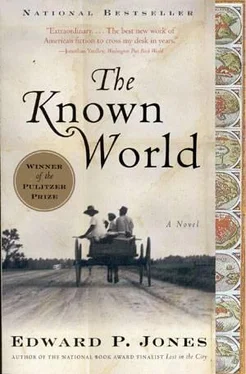“Mrs. Elston,” Calvin said, “why not free him and send him on his way? Might that not be cheaper in the long run?”
“I have considered that. But I believe he has become a kind of debt inherited from my beloved husband. He is mine now and freeing him seems out of the question.” She did not say that freeing a slave was not in her nature. Someone had once told her of a white woman in South Carolina who had freed her slaves after the death of her husband, and one of them had returned and killed the woman.
“Fern, it will sort itself out,” Caldonia said. The oldest of the students, she had become a confidante of Fern’s and she alone was allowed to call her by her first name. It was not a privilege the others coveted.
“I fear it will,” Fern said and drank the last drop in her glass. “Have I had more port than I am allowed, dear Caldonia? Have I had my share?”
“In this house you are allowed all the port your soul can hold. You know that.”
“One forgets when the mind becomes cluttered.”
“Bennett?” Caldonia said.
Bennett appeared and filled Fern’s glass. He went to Caldonia’s side and whispered to her that Moses had been waiting in the kitchen “to tell you bout this and this.”
She thought she might go to him and tell him she would see him tomorrow, but what Fern had been saying about the slave with two names entered her mind, and she told Bennett to tell Moses that the news of the day could wait unless there was something requiring her attention. She added that she was entertaining guests. Bennett delivered this in his own way, and Moses left for his cabin. Priscilla, his wife, said she had something for him to eat but he told her in as gentle a way as he could that he was not hungry and hoped that would be the end of it. She knew enough to read his mind, and she and her son sat before the hearth and played jack-a-rocks with their collection of pebbles. The boy had been improving, having found that if he threw the pebbles so that they bunched, he had a better chance of beating his mother. Moses, hearing them at play, was close to going out to the woods but he feared he was now sharing the place with Alice. Instead, he went to the equipment shed and sharpened hoes until the lantern light began to fail and his arms ached.
Fern’s mood seemed to improve with the second glass of port, and there was no more talk of the slave Jebediah Dickinson. “I have,” she began not long after Bennett had replaced the candles, “been receiving so many pamphlets about this abolition business. Where they get my name, I will never know.”
“What do you think, Mrs. Elston?” Dora said.
“I realized all over again that if I were in bondage I would slash my master’s throat on the first day. I wonder why they all have not risen up and done that.” She sipped.
“The power of the state would crush them to dust,” Louis said. He spoke, as always, not because he had any well-considered views on an issue, but to impress the women around him, and he was now at a point where the woman he most wanted to impress was Caldonia. He had come to Fern’s classes after Caldonia had completed several years of her education, so she had not had much time to learn who he was. And Calvin had said little about him to her, so in many ways they were still strangers to one another. “The Commonwealth would put an end to it right quick.”
“The state would hesitate,” Calvin said. “It wouldn’t want to lose its own people, so many fine white people, as well as all the people the state depends on to work the fields and do all the other work that helps make Virginia the great Commonwealth.”
“Are you two men talking of war?” Dora said.
“Do you know it by some other name?” Louis said.
Dora laughed. “Slaves against masters. Try to place that image in your head, and then follow that with the image of all the slaves lying dead.”
“I have,” Fern said. “I have indeed.” She was thinking of the boldness with which Jebediah walked away whenever he had a mind to. “The only question for us, around this blessed table, is which side should we choose. I suppose that is what those pamphlets want me to do. Choose my side.”
“Have you?” Caldonia said.
“In my feeble way I believe I have,” Fern said. “I do not think I would fare very well as a dressmaker’s apprentice. ‘Yessum’ and ‘Yessuh’ do not come easily from my mouth. My hands, my body, they fear the dirt of the field.”
“You could teach even more,” Louis said. “You could teach all the time.”
“The light of teaching is slowly going out for me.”
“That comes from having bad pupils,” Caldonia said and the five of them laughed. Fern thought she might have a third glass of port, but as she held the empty glass in her hand, the effects of the first two drinks took firm hold and she smiled at the glass and told herself that two would do for the evening. Since Jebediah arrived her husband had been staying home, but nothing was the same. I am… I am this night a dutiful wife. This night…
“I would leave all of this with any war,” Calvin said.
“You wouldn’t help out the precious slaves?” Louis said.
“Well, now that you say it, now that you put the matter out there, I think I would.”
Caldonia laughed. “Do you think Mama would let you take up arms against her?” In their minds they all saw Maude-arms folded, foot tapping in an exasperated manner-and laughed.
“I would do it with her back turned.” Calvin laughed.
“A bullet in your poor mama’s back, Calvin, how nice?” Dora said.
“You said bullet. I love her too much to do anything more harmful than say no. Besides, my mother lives with a high brick wall at her back. Nothing could penetrate that.” When his mother was ill for all those years, Calvin slept many nights on the floor beside her bed.
“Fine talk for an hour of digestion,” Fern said. “What school taught all of you this?”
“A difficult establishment in Manchester, Virginia.” Louis was looking across the table at his sister, and as he did his traveling eye caught hold of a floating piece of dust and followed it before he blinked.
Her guests slept there that night. In the morning, not long after breakfast, Caldonia and Calvin walked Dora and Louis out to the verandah, where Louis hugged her unexpectedly. “Your hospitality is without equal,” he said, not at all trying to impress her. “The credit,” Caldonia said, “goes to my guests.” The day, much, much later, when Louis asked her to marry him, he would say he had feared asking because he did not think he was worthy. “We are all worthy of one another,” Caldonia would say.
Dora and Louis rode off on their horses. Fern slept late and did not leave until late afternoon. Calvin stayed another night and so was there when Moses came that evening. Bennett came into the parlor to tell Caldonia her overseer was there. She rose.
“What is it?” Calvin asked.
“Nothing of consequence,” she said, excusing herself and going ahead of Bennett out to the kitchen.
“Missus, I just wanted to let you know bout the day, is all,” Moses said as soon as she entered. She did not dismiss Bennett.
“I am entertaining my brother,” she said, walking up to within a foot of him. She wished to see him, her words and posture said, but this was the best she could do for now. “You can tell me all tomorrow evening. Now go home and get a good night’s rest. I know how hard you work.” He nodded and left.
“The responsibilities are coming in on you now, it seems,” Calvin said when she returned.
“One by one,” she said.
“You could be happy with me in New York. New land, new air. We could be happy there. The burdens would fall off our shoulders, Caldonia.”
Читать дальше












